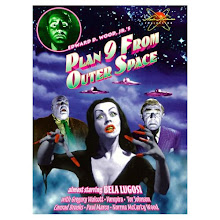by Jason Pyles
Author’s note: I intentionally waited to pair my comments on “The Star Chamber” and “Kick-Ass” due to their common themes of vigilantism. Sorry so lengthy.
Andy, I knew you would either enjoy or hate the “The Star Chamber,” thanks to your professional experience, and I had a feeling it would be the latter. It’s not uncommon for a real-deal industry professional like yourself to balk at Hollywood’s attempted portrayal of his craft ... understandably so.
To me “The Star Chamber” is a tricky little film, meaning it had to do some hoop-jumping not to alienate its audience. Naturally, I defer to Andy’s expertise on all the finer points of the law and inner-workings of the legal system, but I will make my layman’s attempt at discussing this film.
As Andy notes below, we see the abridged version of a few cases where the defendants — who are accused of hideous crimes — are apparently caught red-handed. But due to various instances of logistical mismanagement of said cases, each defendant’s defense attorney is able to spring him. Everyone is outraged and horrified by the absence of justice, especially the judge (Michael Douglas), whose hands are tied, ironically, by the law. (Yet, as Andy points out, the Constitution is simply being upheld.)
Now, I consider this a tricky little film because I am impressed at the relatable way the film conveys the legal points of each case in a comprehensible manner that doesn’t exclude guys like me who have no law school degree. It would have been more impressive still if their legal scenarios had held water, but alas, Andy informs us that they don’t.
And yet, despite all that, “The Star Chamber” takes us on a bit of a moral-dilemma ride, whereby it deviously enlightens us on the problematic nature of vigilantism, as well as our current legal system. I love when a film appears to have one stance, then it appears to have another, and then in the end we realize it just tricked us into considering (or at least listening to) multiple perspectives.
Andy (or anybody), do you know why it’s called “The Star Chamber”? Did I miss something obvious, or is it obscure legal term? Perhaps it’s Kafka’s.
As for “Kick-Ass,” I love this film — who doesn’t? What a great premise: What would happen if a regular, nerdy guy tried to be a superhero? Hasn’t someone thought of that before? Yes, even in reality. A few years ago I saw a news report on a guy in Oregon who walks around in a Spandex get-up doing good deeds. As I recall, the police were insistent that he stick to helping old ladies across the street and recovering cats from trees. And then there’s The Guardian Angels, who are a type of superhero to me.
Aside from its entertaining premise, two aspects of “Kick-Ass” make it brilliant:
1. The film takes an unflinching look at just how dangerous such an ambition could be. (Unfortunately, there will be some, no doubt, who try to emulate viral, YouTube crime-fighting, and that’s probably not a good thing.) Kick-Ass’s first attempt at crime fighting quickly goes from humorous to disturbing to upsetting.
2. And the true genius behind this film is the slick way it begins as a comic-book movie parody — seeming to ridicule the genre — while seamlessly becoming that very object we thought it was mocking. Indeed, “Kick-Ass” ends up following the same formula as most other comic book movies but in a refreshingly clever way. Brilliance.
And yes, I loved Hit Girl, too, just as much as everyone else. However, I have some qualms with her dialogue. (The stylized action violence doesn’t bother me.) Call me a censor, but I don’t think anybody should say that word she says — you know the one — especially not a 13-year-old girl. Also, it’s probably irresponsible of the writers and filmmakers to outfit her in such fetishistic, dominatrix attire, because if we guys are honest with ourselves, there is something “intriguing” about Hit Girl, despite her age — perhaps it’s the purple wig. (I’m not a sicko, by any means, and I’m not the only grown male who has said this. It’s even joked about in the film itself.) Indeed, I’ve heard that Hit Girl’s also a hit with the pedophiles, which is very disturbing.
Here we have two films whose underlying concept is vigilante justice. We Americans love these kinds of films: “Dirty Harry,” “Death Wish,” “The Punisher,” “A Time to Kill” — and pretty much any western or martial arts flick, etc. I guess we find something extremely appealing about taking the law into our own hands, exacting justice as we see fit.
Vigilante films allow us to indulge in the proverbial “ideological safety valve,” in which we get to experience violent fantasies vicariously by visualizing them onscreen, thus relieving our own desires to execute such violence ourselves in the real world. (Road rage murders are a simple demonstration of the folly of vigilantism, by the way; it’s easy to take it too far or to get killed yourself.)
But superheroes are a horse of a colorful color. We seem to deem them worthy of the wisdom to be judges, juries and executioners, though they often don’t kill their perps. But I guess the difference between the two films’ takes on vigilantism is the point at which the justice is administered: In “Kick-Ass,” justice is often delivered on the spot, while the crime is in progress, and “The Star Chamber” still follows some semblance of judicial consideration.
I don’t believe vigilante films (and real-world vigilantism) will ever go out of style. Victims who consider themselves robbed of justice will always find it in vogue to deputize themselves into retaliation. Yeah, in every one of us, there’s probably a Damon “Big Daddy” Macready lying dormant — but capable of eruption, if the circumstances were ever sufficiently provocative.
Addendum: According to the usual 20-year remake rule and the Internet Movie Database, a presumable remake of “The Star Chamber” is currently in development for a 2011 release.






























































No comments:
Post a Comment